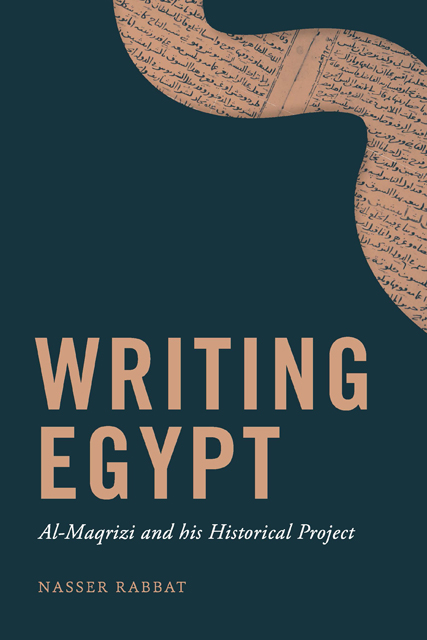Book contents
- Frontmatter
- Contents
- Preface
- List of Short References to Frequently Cited Primary Sources
- List of Abbreviations
- Notes on Transcription and Dates
- Introduction: A Singular Mamluk Historian
- Part 1 The Life of al-Maqrizi
- Part 2 The Writings of al-Maqrizi
- Part 3 The Afterlife of al-Maqrizi’s Writing
- In the Guise of a Conclusion: Becoming the Greatest Historian of Egypt
- Bibliography
- Index of Books Cited in the Text
- General Index
Preface
Published online by Cambridge University Press: 02 June 2023
- Frontmatter
- Contents
- Preface
- List of Short References to Frequently Cited Primary Sources
- List of Abbreviations
- Notes on Transcription and Dates
- Introduction: A Singular Mamluk Historian
- Part 1 The Life of al-Maqrizi
- Part 2 The Writings of al-Maqrizi
- Part 3 The Afterlife of al-Maqrizi’s Writing
- In the Guise of a Conclusion: Becoming the Greatest Historian of Egypt
- Bibliography
- Index of Books Cited in the Text
- General Index
Summary
I did not know al-Maqrizi before my doctoral studies. Visiting Cairo in the summer of my first year on the PhD program, I spent many hot days touring the city’s magnificent Mamluk monuments. I was smitten by their subtle elegance, composite geometry, and pronounced urban character. Upon my return to Cambridge, I decided that my dissertation topic would center on Mamluk Cairo.
For a seminar requiring a research paper on the architectural evolution of a monument, I picked al-Azhar Mosque, which has a long and glorious history. This is when I encountered al-Maqrizi for the first time, or more precisely his encyclopedic Khitat, the most comprehensive source on Cairo until the fifteenth century.
My focus on Cairo grew, and al-Maqrizi’s work became indispensable to my research. In 1997–8, I began preparing a book on how medieval Arabic sources treated visual culture. Al-Maqrizi naturally constituted a good part of that study. But when I shared the unfinished manuscript with colleagues, Renata Holod recommended that al-Maqrizi deserved separate treatment. So was born the idea to write a book on him.
The project remained an idea for a couple of years. I gave a few presentations and published a few articles on al-Maqrizi’s work. All along, I read all that al-Maqrizi wrote and all that was written about him. But I still had no access to the man himself, his life, worldviews, and motivations in devoting his adult life to history writing. Then, in 2002, Mahmoud al-Jalili published his family heirloom: a unique complete manuscript of al-Maqrizi’s biographical dictionary, Durar al-‘Uqud al-Farida fi-Tarajim al-A‘yan al-Mufida, which he had until then withheld from researchers.
To me, the Durar represented a qualitative leap. In it, al-Maqrizi not only collected the biographies of people whom he knew directly, including members of his family, teachers, friends, companions in his spiritual journey, rivals, patrons, and contemporary amirs and sultans, but also reported detailed stories about his dealings with them. The text thus opened a window into a more intimate knowledge of al-Maqrizi’s feelings and musings about members of his social circle, offering an exceptional potential for a thorough biography of the man.
The Durar, however, also presented a challenge. I now had a treasure trove of material that required not only verification and cross-referencing, but also a reorientation of my research.
- Type
- Chapter
- Information
- Writing EgyptAl-Maqrizi and his Historical Project, pp. vi - viiiPublisher: Edinburgh University PressPrint publication year: 2023

